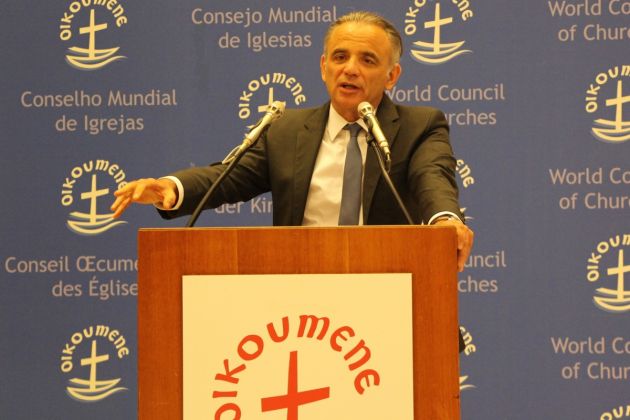World churches body prays on World AIDS Day, saying 'forsake nobody'

During a World Council of Churches prayer on Dec. 2, those gathered commemorated World AIDS Day, which was observed the day before as many churches worldwide have long supported carriers of HIV and AIDS who were once heavily stigmatized.
South African pastor, Rev. Christo Greyling, a member of the WCC's Health and Healing Commission, and the chair of the Working Group on HIV and Reproductive Health, offered a reflection on World AIDS Day.
This year the theme is, "Take the 'rights' path: My health, my right!"
The prayer read: "Give us new eyes for seeing the injustice you see, new ears for hearing the cries arising for help, new energy for doing your will, so that no one living with HIV remains forsaken, and no one, regardless of their origin or status, stays forgotten by those who have what they need."
Greyling noted that the scriptures make it abundantly clear that we are all entitled to a dignified life. "The concept of one body has to move beyond rhetoric," he said. "It has to be experienced."
According to the latest UNAIDS report on HIV, 40 million people globally are living with HIV, 1.3 million people have newly acquired HIV, and 630,000 people died from AIDS-related illnesses.
Almost 31 million people are receiving lifesaving antiretroviral therapy, according to UNAIDS.
Still, a quarter of people living with HIV who need lifesaving treatment, especially children and adolescents living with HIV, are yet to be treated. At least half of all people from key populations are not being reached with prevention services.
Greyling noted that humanity has to be empathetic to one another's needs, and in solidarity, respond in a timely manner with compassion and competence.
"We cannot rest when parts of this one body are suffering and are being stigmatized," he said. "We have to respond responsibly and together and make a difference in the lives of those who are hurting."
Greyling especially urged the mentoring of young leaders. "We are running a relay race," he said."
He said the world can end AIDS—if the human rights of people living with or affected by HIV are respected, protected and fulfilled.
"As a community of faith, let us act together in faith."
UNAIDS cited Ethiopia's refugee camp at Jewi—in the western province of Gambella which has the highest HIV burden across the county.
It is equipped with its antiretroviral therapy center.
However, like in Tigray, Gambella faces significant challenges in providing HIV testing and treatment.
Limited mobility within and beyond the camps, due to the costs of transport for clients and a shortage of ambulances in medical emergencies, combined with resource constraints at health centres, often results in treatment interruptions and high rates of loss to follow-up.
The WCC prayer also occurred during the "16 Days Against Gender-based Violence" campaign.
The prayer noted that gender inequalities, and unequal power dynamics between men and women and harmful gender norms are making women and girls vulnerable to HIV.
"It is depriving them of the voice and the ability to make decisions regarding their lives, and reducing their ability to access services, including for HIV," read the prayer. "Help us to be contrite and humble and transform harmful gender and masculinity norms among men and boys to help reduce vulnerabilities to HIV among women and adolescent girls."
Churches and communities are called to champion the right to health by addressing the inequalities that hinder progress in ending AIDS.